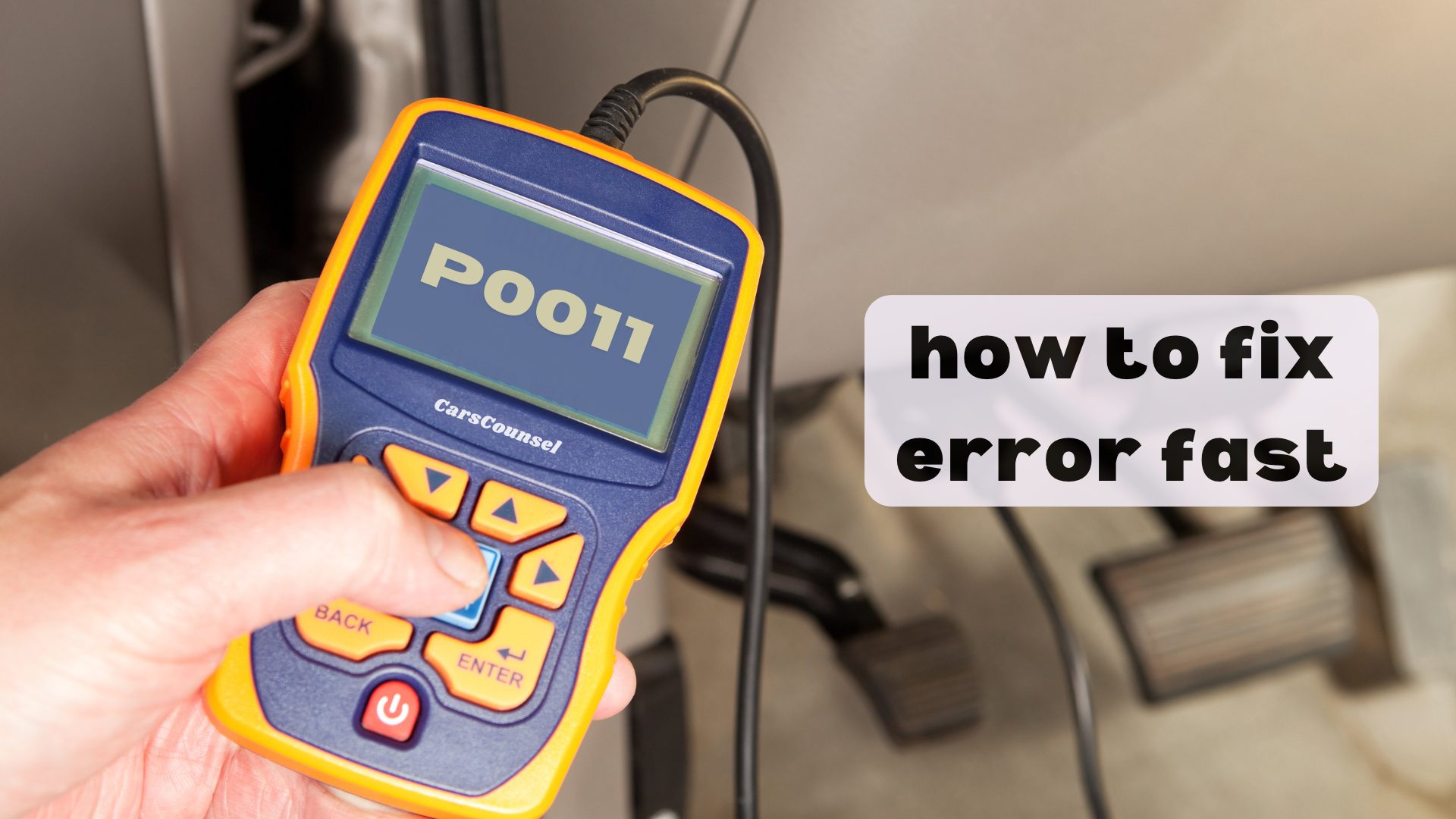When your car’s check engine light comes on and you find out it’s the P0011 code, it’s crucial to act quickly to prevent more damage. This code usually signals problems with the camshaft timing, which can seriously impact your engine’s performance.
Start by doing a detailed visual check, especially looking at the camshaft position sensor and timing parts. But don’t stop there; using an OBD-II scanner can confirm the error and help find other issues.
Wondering what to do next or how to deal with a faulty sensor? Let’s dive into how to fix this problem quickly and efficiently.

Quick Navigation
Key Takeaways
- Check the camshaft position sensor and replace it if it’s not working properly.
- Make sure the engine oil is at the right level and is in good condition.
- Look at the timing chain or belt to see if it’s worn out or not aligned correctly.
- Use an OBD-II scanner to read the error codes and clear them if needed.
What Is the P0011 Code?
The P0011 code means there’s an issue with the camshaft position sensor, showing that the camshaft is turning too far ahead of where it should be.
This problem often comes from the camshaft not being aligned right or the sensor not being set up correctly. When the camshaft isn’t aligned properly, it messes up the precise timing your engine needs to run well.
The sensor’s job is to tell the engine control unit (ECU) where the camshaft is. If the sensor isn’t working right or gives bad info, the ECU can’t control the camshaft properly, causing performance problems.
Regularly checking and maintaining both the camshaft alignment and the sensor setup can help avoid these issues and keep your engine running smoothly.
Importance of Camshaft Timing
Proper camshaft timing is crucial for top engine performance by keeping the camshaft and other engine parts in sync.
When the camshaft is correctly aligned, the valves open and close at the right times, allowing the ideal mix of air and fuel to enter and exit the engine. This timing directly impacts how efficiently and powerfully the engine runs.
If the camshaft isn’t aligned properly, it can cause a drop in performance, higher emissions, and even damage the engine.
Making sure the camshaft works perfectly with the crankshaft helps avoid problems like misfires and poor fuel efficiency.
Regularly checking and maintaining the timing system is key to keeping your engine running smoothly and preventing issues like the P0011 code.
Symptoms of P0011 Code
If your car shows a P0011 code, you might notice some clear signs like less engine power, engine misfires, and more noise from the engine.
These problems can vary in how bad they are, but you’ll likely feel that your engine isn’t running right. Engine misfires can cause your car to idle roughly and accelerate poorly.
More noise from the engine, especially when you speed up, usually means there’s a timing issue with the camshaft. A bad camshaft can also make the check engine light come on, which means you need to fix it right away.
Ignoring these signs can lead to more damage, so it’s important to check and fix the issue as soon as possible to keep your engine running well.
Common Causes of P0011
Common reasons for a P0011 code are a bad camshaft position sensor, issues with the timing chain or belt, and blocked oil passages.
If the camshaft position sensor isn’t working right, it can send wrong information and mess up the engine timing. Problems with the timing chain or belt can misalign parts, causing synchronization issues.
Also, poor-quality oil can block passages, preventing proper lubrication and causing the camshaft to advance too far. Regularly check and change your engine oil to avoid these problems.
Electrical issues can also cause sensor failures, so make sure all connections are tight.
Fixing these problems quickly helps keep your engine in good shape and prevents further issues.
Impact on Engine Performance
When a camshaft position sensor isn’t working right, it triggers the P0011 code, which messes up your engine’s performance. This happens because the valve timing gets thrown off, causing your engine to lose power and possibly get damaged.
If the camshaft timing is incorrect, your engine won’t run efficiently since the air-fuel mixture and exhaust processes won’t line up properly. This can lead to problems like engine misfires, rough idling, and slower acceleration. Overall, your engine becomes less efficient, using more fuel and producing more emissions.
If you keep driving with this problem, it could cause serious damage to important engine parts like pistons and valves. Fixing the P0011 code quickly is crucial to get your engine running well again and to keep your car in good shape.
Visual Inspection Steps
To fix the problems suggested by the P0011 code, start by checking the engine oil level and quality. Make sure the oil is clean and at the right level, since dirty or low oil can mess with the camshaft.
Next, look at the camshaft position sensor and its wiring to see if there’s any wear or damage. Use tools like an OBD-II scanner to read fault codes and confirm if there are sensor issues.
Also, check the timing chain or belt for any stretching or wear. Doing a thorough visual check and using diagnostic tools are key to finding and fixing the causes of the P0011 code efficiently.
Checking Oil Levels
Checking that your engine oil level is right and that the oil is clean is really important for keeping your camshaft working well and avoiding the P0011 code.
Start by looking at the oil dipstick to make sure the oil level is between the minimum and maximum marks. If the oil is too low, it won’t lubricate well, which can mess up camshaft timing.
Also, check the oil’s thickness; if it’s too thick or too thin, it can cause engine problems. You might want to use oil additives that help with lubrication and keep the engine clean.
Dirty oil or oil that’s not the right thickness can clog up oil passages and reduce how well it lubricates.
Keeping the oil level and quality just right is a simple but crucial step in preventing the P0011 code and keeping your engine healthy.
Using an OBD-II Scanner
[Speak in plain English]
After making sure your oil levels are good, the next step is to use an OBD-II scanner to figure out the P0011 code. An OBD-II scanner gives you accurate readings of your car’s diagnostic system. Just plug the scanner into the OBD-II port, which is usually under the dashboard. Follow the scanner’s instructions to read the error codes. This helps you get reliable data to find out what’s causing the P0011 code.
| Step | What to Do |
|---|---|
| 1 | Find the OBD-II port |
| 2 | Plug in the scanner |
| 3 | Follow the prompts to read the codes |
Using an OBD-II scanner the right way helps you make smart repair choices, keeping your car running well.
Fixing a Faulty Sensor
Replacing a bad camshaft position sensor is key to fixing the P0011 code and keeping your engine running well.
First, find the sensor, usually located near the engine camshaft. Disconnect the battery to stay safe from electrical shocks.
Use a multimeter to check if the sensor is truly faulty before replacing it. Remove the old sensor by unplugging its wiring harness and taking out any bolts.
Put in the new sensor, making sure it fits well and is connected properly. Reconnect the battery and use an OBD-II scanner to clear the error code. Following these steps will help get your engine’s timing and performance back on track.
Always refer to your vehicle’s service manual for detailed instructions and torque settings during the replacement.
Preventive Maintenance Tips
Regularly checking your engine oil level and quality is crucial for avoiding the P0011 code and keeping your engine running smoothly. Changing your oil every 3,000 to 5,000 miles is key for maintaining your engine. Clean oil ensures proper lubrication, reducing wear on camshaft parts.
| Maintenance Task | How Often | Why It’s Important |
|---|---|---|
| Oil Change | Every 3,000-5,000 miles | Keeps passages clear |
| Timing Belt Inspection | Every 60,000 miles | Ensures everything stays in sync |
| Camshaft Sensor Check | Once a year | Catches sensor problems early |
Regular engine maintenance not only helps prevent error codes but also makes your engine last longer. By being proactive, you can avoid expensive repairs and keep your vehicle in good shape.
More OBD-II Codes
Frequently Asked Questions
Can I Drive My Car With a P0011 Code?
You shouldn’t drive if your car has a P0011 code. This code can cause your engine to lose power and misfire. The issue might be due to things like bad sensors or low oil levels. Driving with this problem can make the damage worse, leading to expensive repairs and making your car unsafe to drive.
How Much Does It Cost to Fix a P0011 Code?
Did you know that 60% of the time, a P0011 code comes from camshaft sensor problems? Fixing this usually costs between $150 and $300. Also, keep in mind that you might need to pay an extra $50 to $100 for the diagnosis.
How Long Does It Take to Repair a P0011 Issue?
Fixing a P0011 issue can take different amounts of time. If it turns out you just need to replace a sensor, it might take 1-2 hours. But if the problem is more complicated, like needing to adjust the timing chain, it could take 4-6 hours.
What Vehicles Are Most Prone to P0011 Code?
You’re most likely to see the P0011 code in cars with variable valve timing (VVT) engines. This includes some models from Toyota, Honda, and GM. These engines need exact camshaft timing, so they’re more likely to have this issue.
Are Aftermarket Sensors Reliable for Fixing P0011 Code?
Did you know that 60% of drivers have trouble with aftermarket sensors? When picking aftermarket sensors, make sure they are high quality to ensure they work well. Always check that they are compatible with your car to prevent more engine issues.
Conclusion
By following these steps, you’ll fix that P0011 code quickly.
Remember, a little prevention goes a long way—regular oil checks and timely sensor replacements can save you from bigger issues down the road.
Using an OBD-II scanner and staying on top of maintenance keeps your engine running smoothly, ensuring a better driving experience.
Don’t let a small problem turn into a big one; take action now and keep your engine in great shape.

